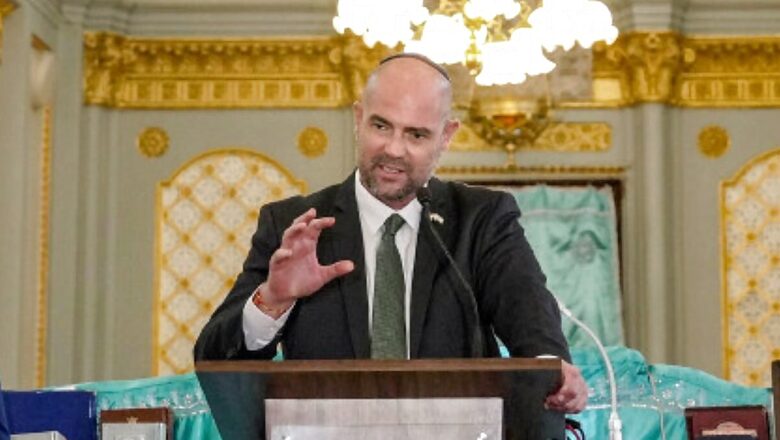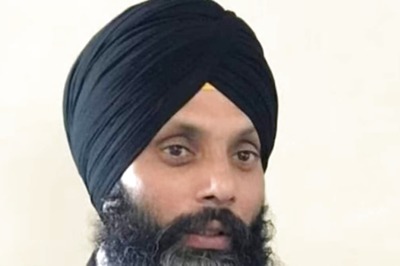
views
Expressing confidence that the internal turmoil and protest will only turn Israel into a stronger democracy, Israel’s Speaker Amir Ohana, in an exclusive interview to CNN-News18, said the government will go ahead with the judicial reforms. This was the first visit by any Speaker of Israel’s Parliament or Knesset to India, which the officials called “historic”. He visited along with two ministers of Israeli government this week.
Speaking of the threat of terror to the only democracy in the Middle-East, he said, “We can’t think of any other way to live than a democracy. In our region, this is also something common to India and Israel. We have experience of terror and counter-terrorism. It is a challenge because when you need to save lives of many people, sometimes you need to take extreme actions. I think we are still a very reliable and strong democracy. Not only shall we remain to be a democracy, but we will be more democratic than what we are today.”
ON JUDICIAL REFORMS
When asked about the unprecedented strikes that rocked Israel on the issue of judicial reforms, he said that the government will go ahead with the judicial reforms despite the protests. “We had promised our voters before the elections that we are going to make a very significant judicial reform. We believe that the balance between the three branches of power — the executive, legislature and judiciary — needs to be amended. It needs to be changed in order for us to be a better democracy. This is exactly what we are trying to do. And as you can imagine, it is a matter of demonstrations within the country.”
"We can't think of any other way to live than a democracy": Speaker Of Israel's Knesset @AmirOhana tells News18's @vinivdvc He also speaks about his first official visit to India amid turmoil in his country, and more
Full interview: https://t.co/e5EyJLF2Y6 pic.twitter.com/52dixAFgID
— News18 (@CNNnews18) April 4, 2023
ON THE WAY AHEAD
When asked about the way ahead, he said, “We are doing everything we can to reach a wide agreement. The whole idea is that we want Israel to be a better democracy where more decisions are taken by the people elected by the public. But if we cannot reach a wider consensus, we will reach conclusion as per the majority, as it happens in a democracy. In the next few weeks, we will finish the discussions and manage to bring a better judicial reform to the people of Israel.”
CRITICISM OF ISRAEL PM NETANYAHU
Answering a question on the criticism on Israeli Prime Minister Benjamin Netanyahu that his actions were leading to autocracy and erosion of democracy, he said, “This is the spirit of democracy. The government brings in ideas for changes and people can protest. This is the proof that we are a democracy and shall remain a democracy after the judicial reform. We assure you we are going to be much stronger, much more democratic than we are now right now. Right now, it is only 15 people who are not elected by the public that take too many decisions and have all the powers and their hands. I am talking about the judges and the judiciary in general. This is exactly what we are trying to balance. We want more decisions which are accepted by the public.”
“We have a system of nine-member committee. Three of them are judges. The public never has a majority in that committee. We are trying to balance that and trying to change that. How could that mean the end of democracy? I cannot accept this idea. It is totally unacceptable,” he said.
TIES WITH INDIA, PM MODI
“Prime Minister Modi and Netanyahu share a great bond. There is a great connection between the people of both the countries. Our people come to experience and understand the culture and the spirit of the Indian people. But we did not have such a good connection between the parliaments. So this is something new we have signed. We have signed a memorandum of understanding between the parliaments to strengthen their relations, to share information, experience and to also exchange delegations of parliaments. I think it will strengthen the relations between India and Israel,” Ohana said.
Narrating his experience about his first visit to the country, he said he felt welcomed. “Thank you for accepting me so warmly in India. This is the country where our people have never experienced hatred, anti-semitism. We are so grateful for the experience,” he said.
India-Israel have collaborated in several sectors till now. He spoke of the significance of collaboration in water and higher technology.
Read all the Latest India News here




















Comments
0 comment